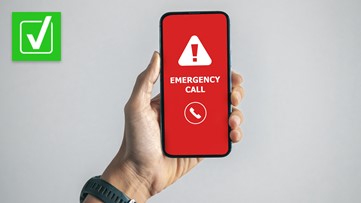GREENSBORO, N.C. — As the COVID-19 pandemic begins to release its tight hold on the world, yet another global health threat rises to the surface.
This time, it's Monkeypox, the rare but rarely deadly disease with symptoms similar to Smallpox.
CDC statistics show it is very uncommon in children, but with schools back in session, there is concern among some parents and teachers about how to continue mitigating germs.
THE QUESTION
Is it true Monkeypox can spread through school surfaces (like desks and sleeping mats)?
THE SOURCES
- The Centers for Disease Control and Prevention
- Utah Department of Health and Human Services
- Chris Ohl, MD - Atrium Health Wake Forest Baptist
THE ANSWER
Yes, Monkeypox can live on surfaces often found in schools, but the risk of infection in children is minimal, and the virus spreads predominantly through intimate skin-to-skin contact.
THE PROCESS
Infectious diseases physician Chris Ohl, MD, stressed surface contact is not the main way Monkeypox spreads.
"The most common way Monkeypox is transmitted is directly from person to person, and this involves skin-to-skin contact. A small number of cases could be transmitted by respiratory droplets, and sometimes people can get it from what we call, in medicine, "fomites" -- the environment around us," Ohl explained.
The CDC's school guidance on Monkeypox states, "At this time, the risk of Monkeypox to children and adolescents in the United States is low," though the agency acknowledges it can spread through contaminated objects, like toys, eating utensils, fabrics and other surfaces used by someone who has Monkeypox.
The Utah Health Department study, referenced by the CDC, took 30 specimens from a home of two people with Monkeypox. Several items had traces of the virus, but none had a positive viral culture result, meaning the virus was not viable or infectious on those surfaces.
"The surfaces that are problematic are soft fabric, so like bedding, towels, things we would use somewhat intimately with skin-to-skin contact. Other surfaces, such as desks, door knobs and telephones are much less likely to become contaminated, because the skin-to-direct contact would be quite unusual," Ohl said.
The CDC notes the best disinfectants for Monkeypox are the same products that are best against COVID or any other "emerging viral pathogen" (EVP). The EPA's pesticide product and label system search page shows which name brands and generics perform best.












